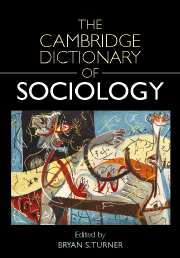I
Published online by Cambridge University Press: 22 October 2021
Summary
ideal type
Max Weber defined the nature and use of the ideal type, though many of the elements of his discussion originated with his colleague Heinrich Rickert (1863–1936). Ideal types are pure concepts that make no claim directly to describe or explain empirical events. They are constructed by social scientific investigators as conceptually pure benchmarks for contrasts and comparisons with facts collected from historically specific cases. Thus, one may use several different ideal types to specify the historical significance and cultural meaning of any given constellation of events. For example, in studying socially disadvantaged groups in a modern nation-state, one might use ideal types of both social class and social status.
According to Weber, sociology as a discipline devotes itself to the construction of ideal types. Though sociological ideal types can make no empirical claims, they gain the advantage in conceptual precision on the level of meaning. Weber's compendium of ideal types in Economy and Society (1922 [trans. 1978]) demonstrates this advantage. Each ideal type includes actions defined by typical subjectively assigned meanings, all of which are logically integrated into a complex concept. Beyond conceptual precision, distilling ideal types from historical sources requires great erudition. Ideal types may be developed on many levels of abstraction. Weber's well-known ideal type of social action is historically unlimited. His ideal-typical model of the routinization of charisma is applicable only in a particular range of situations, and his ideal type of the Protestant ethic applies only to a small group of early modern religious confessions and sects. IRA COHEN
idealism
A view of the world that sees reality as ultimately composed of ideas rather than a realm existing outside human consciousness, idealism reaches this conclusion on the grounds that, without ideas, humans could not function. Because human activity is conscious activity, the world itself is ultimately composed of ideas.
All religious attitudes, conventionally understood, are idealist in character, but they can be described as forms of objective idealism. Objective idealism does not doubt the existence of a reality outside the individual mind, but sees the real world as the creation of gods or God, so that worshipping God or appeasing the gods is essential for human control over nature. In its “deist” form, objective idealism argues that, while the world is ultimately created by God, science studies its regularities and character without assuming any further divine intervention.
- Type
- Chapter
- Information
- The Cambridge Dictionary of Sociology , pp. 277 - 309Publisher: Cambridge University PressPrint publication year: 2006



